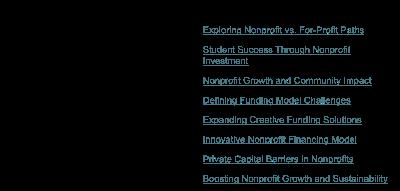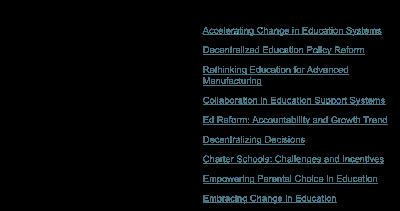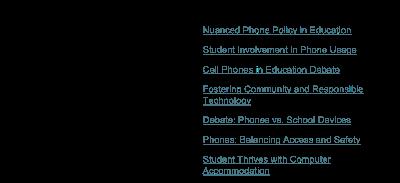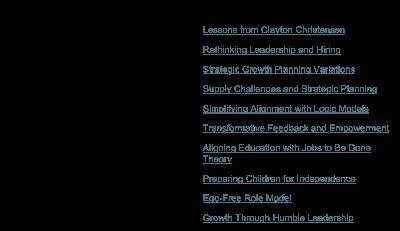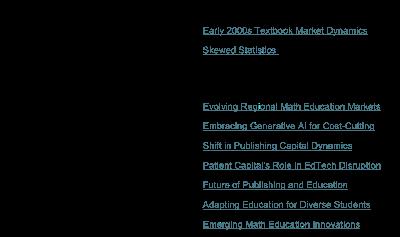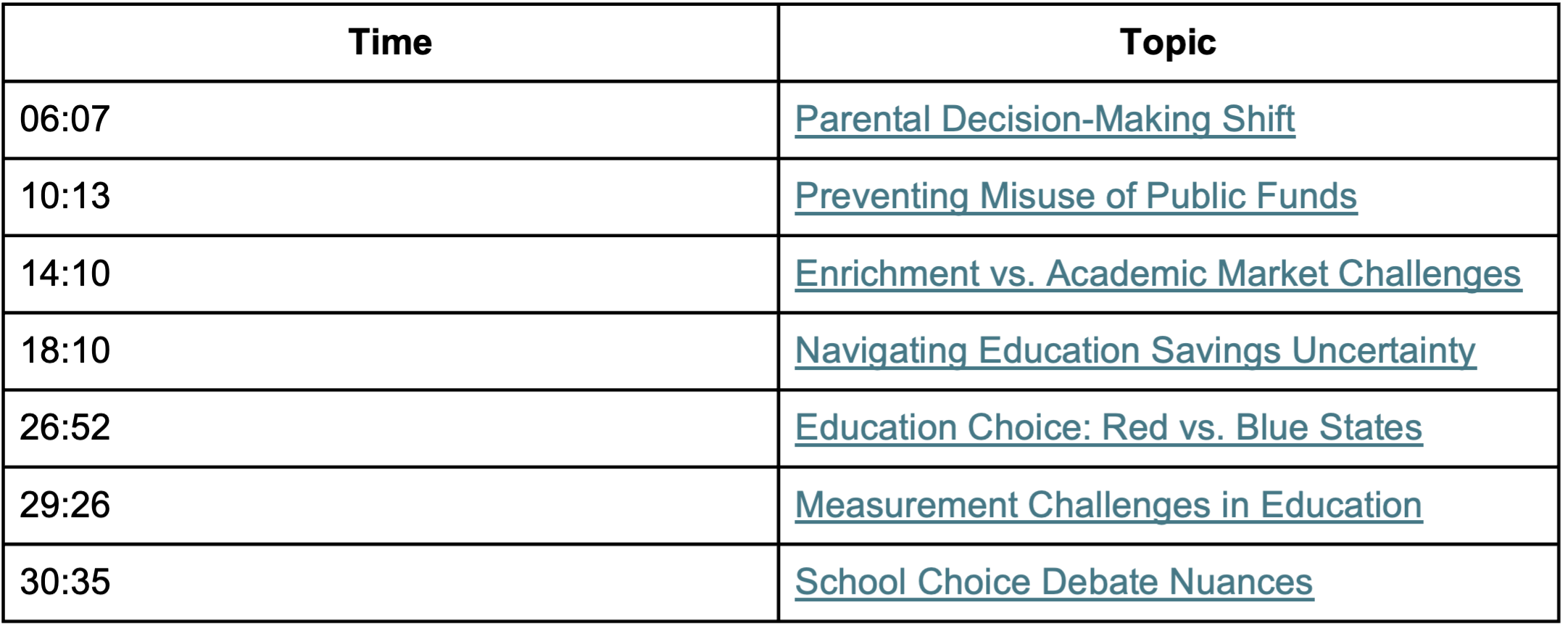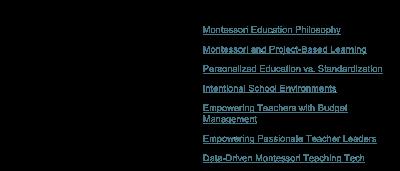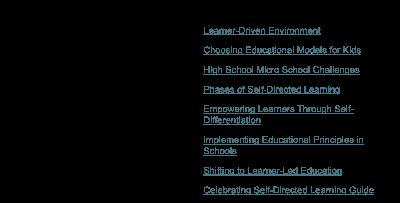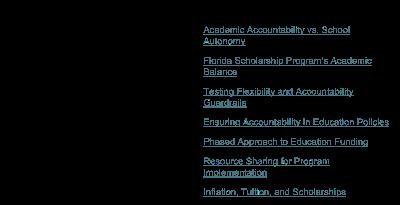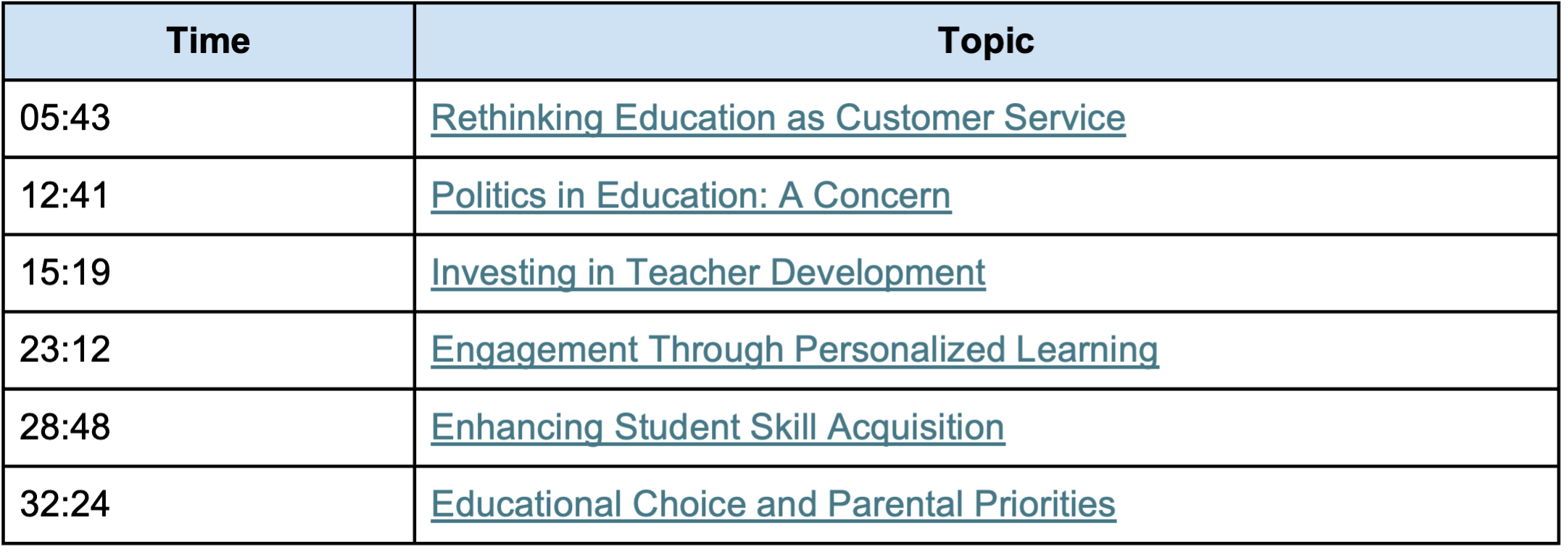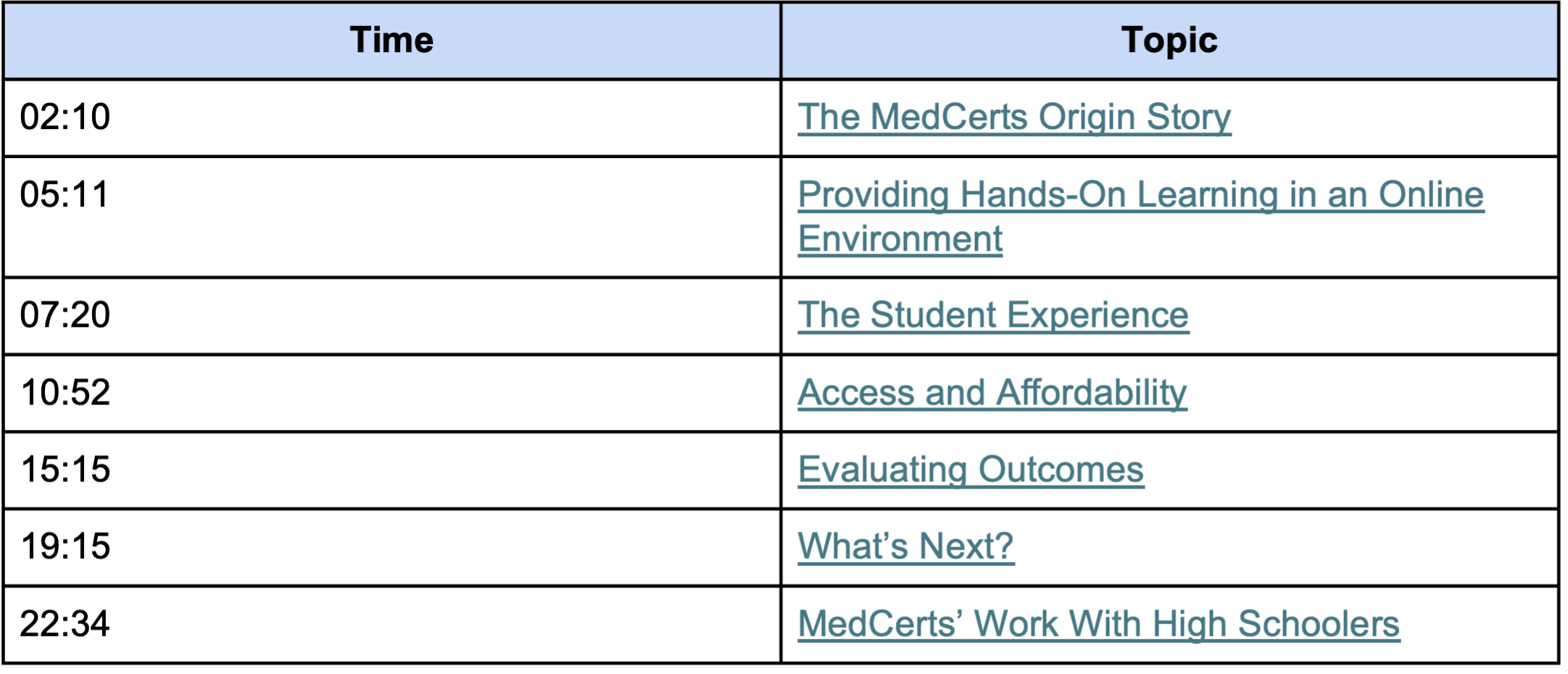What Will It Take For School-Company Partnerships to Thrive
Description
Jessica Gelman, CEO of Kraft Analytics Group (KAGR), and Hillary Casson, CEO of UP Education Network, joined me to discuss their partnership designed to connect middle school students with real-world professional experiences. The conversation explores why early exposure to professional environments is crucial for student growth, details the logistics and structure behind successful school-company collaborations, and highlights the mutual benefits for both students and partner organizations.
Michael Horn
Welcome to the Future of Education. I'm Michael Horn and you are joining the show where we're dedicated to creating a world in which all individuals can build their passions, fulfill their potential and live lives of purpose. And to help us think through that today, I'm delighted we've got two very special guests who do very interesting work in their day jobs and have come together in a very cool partnership that we'll get to talk about. We have Jessica Gelman, she's the CEO of Kraft Analytics Group, and Hillary Casson, who is the CEO of UP Education Network. Hillary, Jessica, great to see you. Thanks so much for being here.
Hillary Casson
Thanks for having us.
Jessica Gelman
Yeah, pumped to be here.
Michael Horn
Yeah, let's, well, let's start with a lightning round just to introduce you both to our audience, the organizations that you both lead. I don't know how many of my listeners will be familiar frankly with UP Education Network or the Kraft Analytics Group. So Hillary, Jessica, why don't you give us a bit about your respective organizations, what you all do so people really can get a sense of the context and a clear idea of the day to day mission of both. Jessica, why don't you jump in first?
KAGR: Data-Driven Sports Engagement
Jessica Gelman
Sure. So, KAGR, we work with sports organizations predominantly on helping them use data and technology to engage and understand their customers better. So at our heart, we're like a data warehouse. So integrating a bunch of different insights about who the customers are and helping with machine learning models and some AI and data integrations. And then we also do a bunch of consulting and some of our clients who the audience might be interested in include everyone from the NFL to the NCAA to NASCAR to, you know, the, I guess here in Massachusetts, the Patriots, obviously. And we spun out of Kraft Sports and Entertainment about nine years ago. So that's kind of the what we do. And it's obviously very data rich and STEM focused.
And I would also just say separately, but connected to this conference or to this discussion. I also co-founded and co chair the MIT Sloan Sports Analytics Conference.
Michael Horn
Very cool. Yeah, very cool. Which people love. Let me ask you this question before I let Hillary get in there. You just said the connection to the Patriots and Robert Kraft, obviously, but how did you get to be CEO of such an interesting organization and such a cool job?
Jessica Gelman
Sure. Well, I've been working with the Kraft family for 23 years. They created a role for me right out of Harvard Business School and I was running many parts of the Patriots business operations and we were using data to again, better engage Patriots and Revolution fans and then, in short, it was very analytically heavy. But I partnered with the Krafts on the creation of KAGR. The original concept was 11 years ago, and then we officially spun out nine years ago. So I think just like from a data perspective, maybe just to share, we touch today over 75 million sports fans across our data warehouses. So, again, the growth of the business and where we started nine years ago to where we are today is something that we're really proud of. And then I'll speak, of course, to the diversity within our leadership team and across the organization and why partnering with Hillary is something that's so important and near and dear to us.
Michael Horn
Well, perfect transition, Hillary. Take it away. Tell us about UP Education Network and your own journey there.
UP Education Network: Revitalizing Struggling Schools
Hillary Casson
Sure. UP Education Network is an organization that manages and runs schools and partnerships in partnership with districts. And we were founded essentially like a restart organization that partnered with districts to propel schools that had been stuck at some of the lowest achievement levels and percentile levels. And we've done that across the state in a number of different regions. And we are different in that we do partner with districts to prove that public school can and must work for every kid. And we're different in that we intentionally really serve communities that have been distanced from resources. Our student need level is a bit higher than your average district, school or charter school. And we commit on behalf of the districts, but even more so on behalf of the families and students, to really propel those schools so that they have an amazing school in their communities that sets kids up for a life of agency and purpose and freedom beyond the time that they're with us.
We started in 2010, and now we have two campuses in Dorchester and serve 1300 kids ages pre K to 8. And our schools, one thing I love about our two schools is that they're walking distance from each other. So we really have a huge impact on this community, in particular. I have, similar to Jess, have been kind of a lifer at up. I started, I moved just because I was so taken by the mission. I moved from Baltimore to help found one of our schools.
Michael Horn
Oh, wow.
Hillary Casson
And, yeah, I didn't know anybody up here, and I was like, I want to work there for that mission and purpose. But I've been here since, that was 11 years ago. And I was an assistant principal, then a principal, and then I was coaching the principals for the network. And now I'm in my second year as CEO.
Michael Horn
And you mentioned the student base is, you know, perhaps lower income, more diverse than a lot of the districts or Charters in the area just give us a sense of who those students are.
Hillary Casson
Sure. The first thing I'll say about our students is that they are just like amazing and so immensely capable and the communities that we work with are so asset rich and phenomenal. But from a demographic purposes, about 93% of our students are coded as high needs, according to state designations, compared to, you know, about a 70% average for charters/public. There's a little bit of variation there, but. And about 40% of our students are language learners, so actively working on building their English proficiency with even higher percentages having a first language other than English. And then most of our students are low income.
Michael Horn
Gotcha. Super helpful, yeah, super helpful I think to give us a sense of who you're serving. So in the last year, as I really understand it, like UP education network in existence for 15 years, but you have started to make a very big push to help students get far more experiences with companies in professional settings out in the real world, so to speak. So perhaps before we get into the specifics and what that looks like, just tell me about the why behind that push. Why did you conclude that this was going to be really important?
Preparing Students for Life
Hillary Casson
Sure, I think it was. First of all, it's been so fun and such a privilege. But in thinking about why do that, I really believe that in my position or in any educator's scope, is you're really required to think about how do I set this human being or this group of human beings up for success long term. I believe that the purpose of school is to prepare folks to have a life of agency and freedom and to choose their own path. And ideally that path allows them to, you know, get a living wage, you know, build a family if they choose to, etc. And so what I know to be true, both from life experience, as a person who grew up in a very rural area that had very limited access to opportunity and sight lines, and then also as an educator that we cannot stop preparing kids just at academics. And don't get me wrong, like academics are absolutely essential. Like if we don't at baseline prepare kids academically, we've failed.
And that is not the only thing that kids need to be successful. And I think you look at any person who has attained success and how I'm going to say that is that they're able to feed their family, make choices, have leisure time, things of that nature. There is more happening for them than just academic success. So just thought a lot about, like, what does it take to break down silos and build those skills that help folks long term. And to me, a lot of that is like providing kids sight lines. And so we were like, wow, we are in Boston. Like, what an amazingly asset rich area. Let's get kids exposure, experiences and all along the way help them feel really good about the process.
So that's kind of like the why at a macro level.
Michael Horn
Perfect. Well, let's get into the what before I bring Jessica in and how they started KAGR started to interface with this. What did you create for students? I know you started to create these partnerships with companies so that they would get that exposure, connection, awareness, sight lines. But what does it look like on the ground over the course of a year? What's that student's experience like?
Hillary Casson
Sure. And I hav



